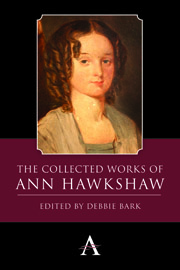Book contents
- Frontmatter
- Contents
- Preface and Acknowledgements
- Biographical Introduction
- 1842: ‘Dionysius the Areopagite’, with Other Poems
- 1843: Life's Dull Reality
- 1847: Poems for My Children
- 1854: Sonnets on Anglo-Saxon History
- 1871: Cecil's Own Book
- Appendix A
- Appendix B
- Bibliography
- Index of Titles
- Index of First Lines
Preface and Acknowledgements
Published online by Cambridge University Press: 05 May 2014
- Frontmatter
- Contents
- Preface and Acknowledgements
- Biographical Introduction
- 1842: ‘Dionysius the Areopagite’, with Other Poems
- 1843: Life's Dull Reality
- 1847: Poems for My Children
- 1854: Sonnets on Anglo-Saxon History
- 1871: Cecil's Own Book
- Appendix A
- Appendix B
- Bibliography
- Index of Titles
- Index of First Lines
Summary
In the early 1990s Ann Hawkshaw's poetry was included in the first wave of the critical recovery of Victorian women poets led by Isobel Armstrong. Armstrong included Hawkshaw in her landmark survey of women's poetry of the Victorian period, ‘“A Music of Thine Own”: Women's Poetry — An Expressive Tradition?’ in Victorian Poetry: Poetry, Poetics and Politics (1993). Armstrong notes that Hawkshaw was ‘an educated poet with strong working-class connections who produced orthodox-seeming work with unusual subtexts’, judging Hawkshaw to be ‘an impressively strong and independent writer’. She comments on Hawkshaw's long narrative poem ‘Dionysius the Areopagite’, mentions her sonnet sequence, Sonnets on Anglo-Saxon History, and makes brief readings of ‘Why am I a Slave?’ and ‘The Mother to her Starving Child’. She concludes that Hawkshaw's work ‘is exceptional’ (323). Hawkshaw's short lyric poems ‘Why am I a Slave?’ and ‘The Mother to her Starving Child’ are included in Nineteenth-Century Women Poets: An Oxford Anthology (1996), co-edited by Armstrong. The entry for Hawkshaw, which begins ‘very little is known about Ann Jackson's (later Hawkshaw's) life’, goes on to give a brief outline biography, noting her Manchester connections to Elizabeth Gaskell and Samuel Bamford and suggesting that she may have been a Unitarian. The biographical introduction concludes by identifying Hawkshaw as the children's poet, ‘Aunt Effie’: ‘She was best known for the children's poetry that she wrote under the name of ‘Aunt Effie’, whose two books of nursery rhymes were brought out in 1852 and 1854’ (346).
- Type
- Chapter
- Information
- The Collected Works of Ann Hawkshaw , pp. xi - xivPublisher: Anthem PressPrint publication year: 2014

